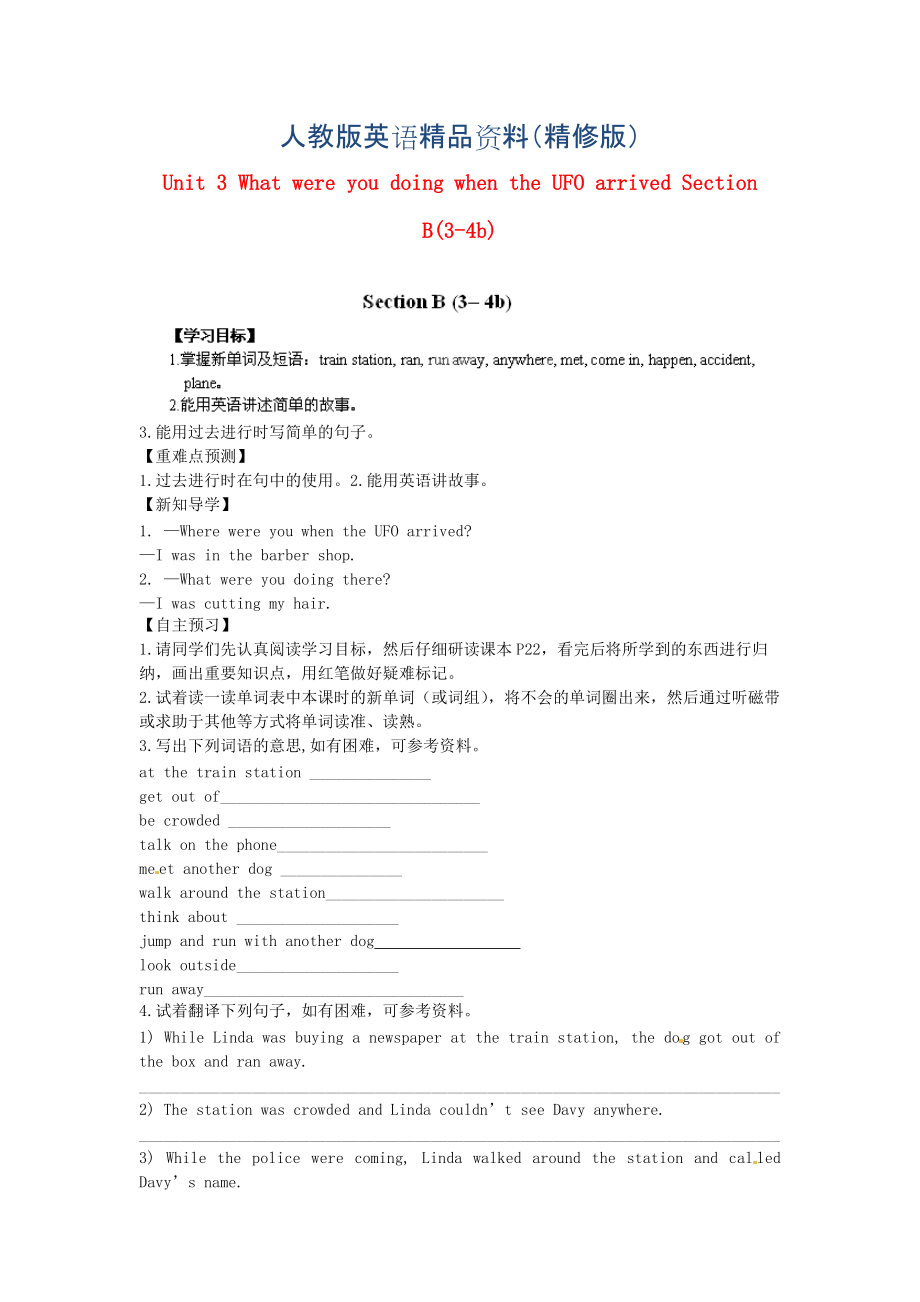《江西省八年級(jí)英語(yǔ)下冊(cè) Unit 3 What were you doing when the UFO arrived Section B(34b)導(dǎo)學(xué)案 人教新目標(biāo)版精修版》由會(huì)員分享�����,可在線閱讀�����,更多相關(guān)《江西省八年級(jí)英語(yǔ)下冊(cè) Unit 3 What were you doing when the UFO arrived Section B(34b)導(dǎo)學(xué)案 人教新目標(biāo)版精修版(3頁(yè)珍藏版)》請(qǐng)?jiān)谘b配圖網(wǎng)上搜索��。
1����、人教版英語(yǔ)精品資料(精修版)
Unit 3 What were you doing when the UFO arrived Section B(3-4b)
3.能用過去進(jìn)行時(shí)寫簡(jiǎn)單的句子。
【重難點(diǎn)預(yù)測(cè)】
1.過去進(jìn)行時(shí)在句中的使用���。2.能用英語(yǔ)講故事���。
【新知導(dǎo)學(xué)】
1. —Where were you when the UFO arrived?
—I was in the barber shop.
2. —What were you doing there?
—I was cutting my hair.
【自主預(yù)習(xí)】
1.請(qǐng)同學(xué)們先認(rèn)真閱讀學(xué)習(xí)目標(biāo),然后仔
2����、細(xì)研讀課本P22,看完后將所學(xué)到的東西進(jìn)行歸納���,畫出重要知識(shí)點(diǎn)�����,用紅筆做好疑難標(biāo)記����。
2.試著讀一讀單詞表中本課時(shí)的新單詞(或詞組)�,將不會(huì)的單詞圈出來,然后通過聽磁帶或求助于其他等方式將單詞讀準(zhǔn)����、讀熟。
3.寫出下列詞語(yǔ)的意思,如有困難�����,可參考資料����。
at the train station _______________
get out of________________________________
be crowded ____________________
talk on the phone____________________
3�、______
meet another dog _______________
walk around the station______________________
think about ____________________
jump and run with another dog
look outside____________________
run away________________________________
4.試著翻譯下列句子���,如有困難����,可
4����、參考資料。
1) While Linda was buying a newspaper at the train station, the dog got out of the box and ran away.
_______________________________________________________________________________
2) The station was crowded and Linda couldn’t see Davy anywhere.
____________________________________________
5����、___________________________________
3) While the police were coming, Linda walked around the station and called Davy’s name.
______________________________________________________________________________
4) When Linda finally saw Davy, he was jumping and running with another dog.
_______________
6、________________________________________________________________
5) It was difficult to get out of the bed.
_______________________________________________________________________________
5.朗讀課本上P22 的Part3 的文章����,并回答課本中的5個(gè)問題。
【合作探究】
任務(wù)1:請(qǐng)根據(jù)課文提供的問題復(fù)述課文���,在小組內(nèi)試一試���,組員互相糾錯(cuò)。
任務(wù)2:課本P22上的4a中發(fā)生了什么故事�,先在組內(nèi)交流每
7�����、幅圖片發(fā)生的故事,然后編成一個(gè)完整的故事�,用筆寫一寫,看誰(shuí)的故事寫得最完整�����、有新意��。
________________________________________________________________________________________________________________________________________________________________________________________________________________________________________________________________
8���、__________________________________________________________________________________________________________________________________________________________________________________________________________________________
任務(wù)3:課文4b角色表演�����,警察調(diào)查活動(dòng)�。
考點(diǎn)聚焦
◆somewhere和anywhere區(qū)別和用法
1.somewhere常用作副詞�,意為“到某處,在某
9���、處”�����, 用于肯定句�。如:
I want to live somewhere else.
2.anywhere“在任何地方,到任何地方”���,用于否定句�、疑問句��、if(whether)從句中��。如: Have you seen my watch anywhere?
練一練:用somewhere或anywhere填空
1. The student left his umbrella _____________on the bus.
2. Did you see my eraser ___________just now?
3. I can’t see my English book____
10����、__________.
◆happen的用法
1. "sth.+happen+地點(diǎn)/時(shí)間",意為"某地/某時(shí)發(fā)生了某事"�����。如:
A car accident happened in that street yesterday.
2. "sth.+happen to+sb."意為"某人出了某事(常指不好的事發(fā)生在某人身上)"�。如:
A car accident happened to him yesterday.
3. "sb.+happen+to do sth."意為"某人碰巧做某事"。如:
I happened to meet her in the street las
11����、t night.
*注意:
1. happen為不及物動(dòng)詞����,不能用于被動(dòng)語(yǔ)態(tài)���。例如�,要表示"這個(gè)故事發(fā)生在去年���。"不能說:The story was happened last year.應(yīng)該說:The story happened last year.
2. happen為短暫性動(dòng)詞,不能與表示一段時(shí)間的狀語(yǔ)連用����。要表示"這事發(fā)生一年了。"不能說:This happened for one year.應(yīng)該說:This happened one year ago.
3. happen一般用來強(qiáng)調(diào)某事發(fā)生的偶然性�����。如要表示事先安排或有準(zhǔn)備的事情或活動(dòng)����,則不能用happen,而要用tak
12����、e place����。如:
A sports meeting took place (=was held) in our school last week. (不能說:A sports meeting happened in our school last week.)
練一練:選擇正確答案
( ) 1.—What___________ you , Tom?
—I left my notebook at home.
A. happened B. was happened C. happened to D. happened on
( ) 2. He
13���、__________ go out when I called him.
A. happened B. happened to C. happens D. happen
【學(xué)案整理】
____________________________________________________________________________________________________________________________________________________________________________________________________________________________________________________________________________________________________________________________
Section B (3– 4b)
練一練:1.somewhere 2. anywhere 3.anywhere
練一練:1.C 2.B
 江西省八年級(jí)英語(yǔ)下冊(cè) Unit 3 What were you doing when the UFO arrived Section B(34b)導(dǎo)學(xué)案 人教新目標(biāo)版精修版
江西省八年級(jí)英語(yǔ)下冊(cè) Unit 3 What were you doing when the UFO arrived Section B(34b)導(dǎo)學(xué)案 人教新目標(biāo)版精修版

